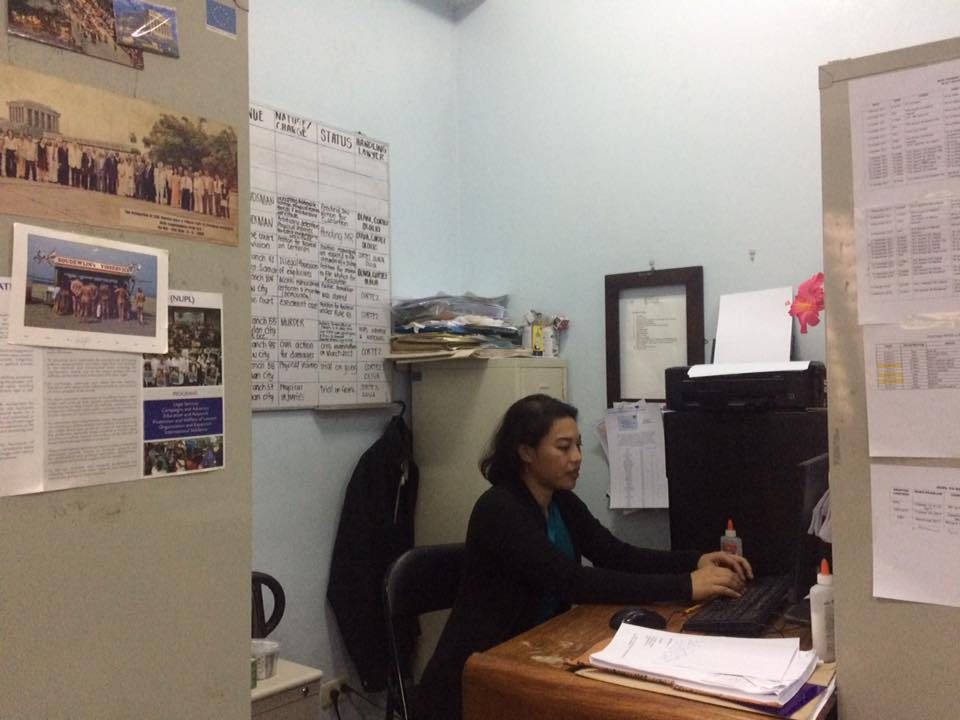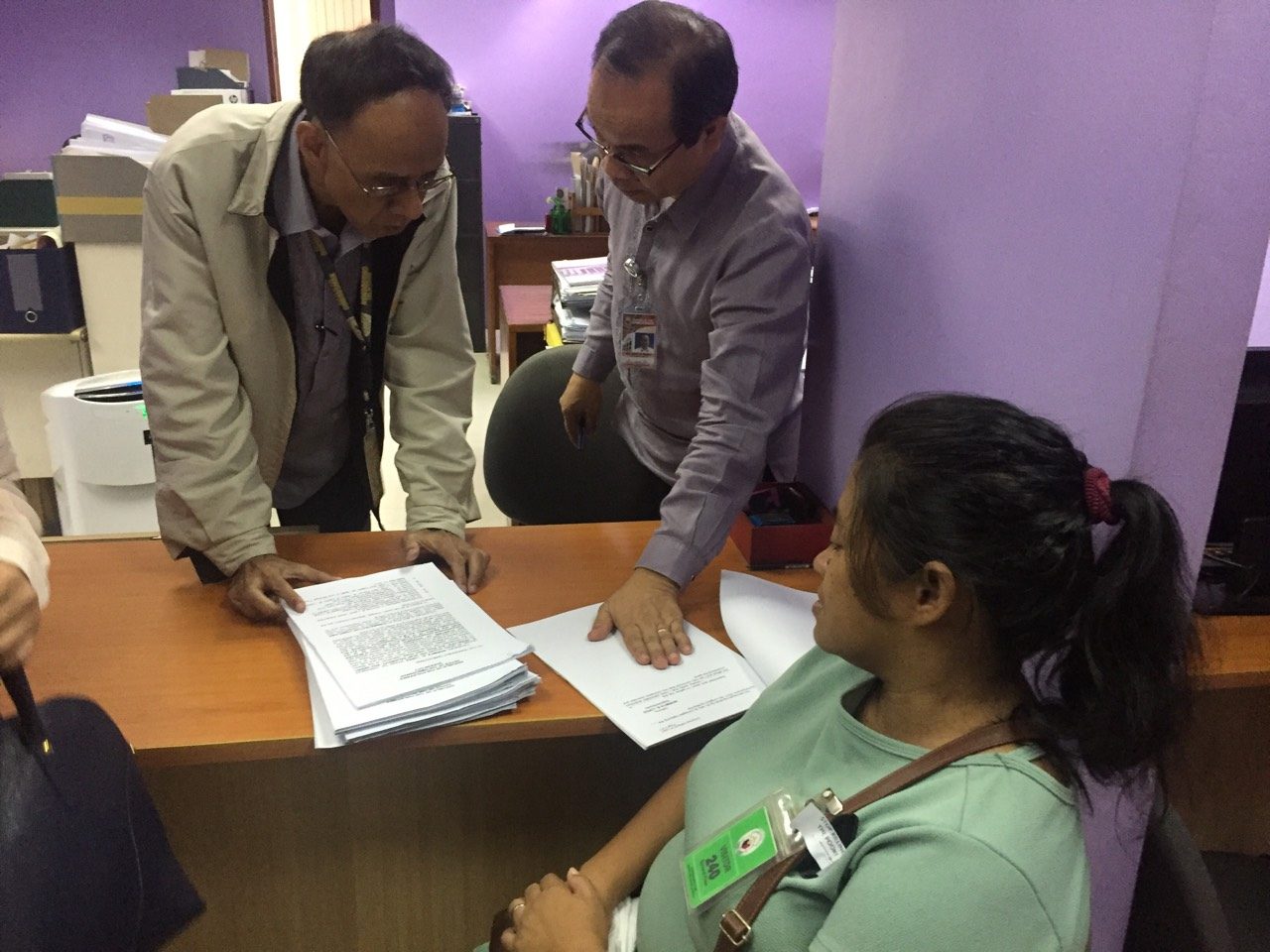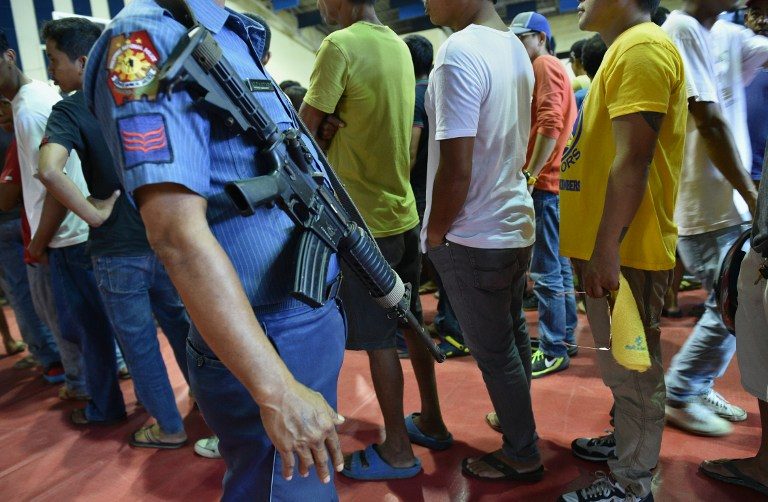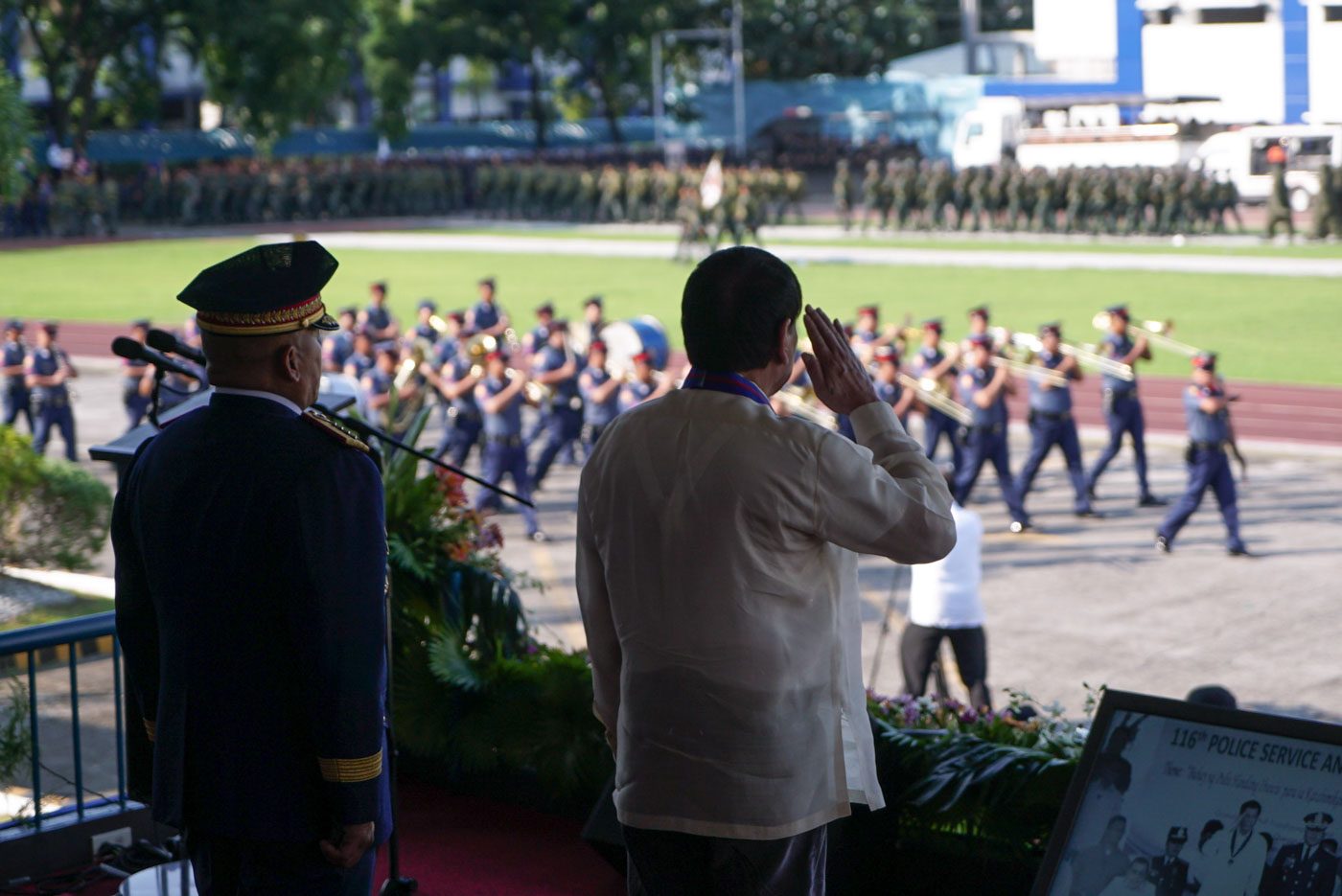SUMMARY
This is AI generated summarization, which may have errors. For context, always refer to the full article.

MANILA, Philippines – Lawyer Cristina Antonio was summoned sometime last week to the barangay hall of San Andres Bukid in Manila, where furious officials demanded an explanation why, without their knowledge, they filed a Supreme Court (SC) petition alleging 35 cases of extrajudicial killings in their area in the last 13 months and pointed to the police as masterminds.
“Ipit sila (they’re caught in the middle). It’s a case of damned if you do, damned if you don’t,” Antonio told Rappler in an interview held inside the small Makati office of the Center for International Law or Centerlaw, a non-governmental organization that’s been on the forefront of filing cases challenging the bloody drug war of President Rodrigo Duterte.
The wrath of barangay officials of San Andres Bukid is understandable, Antonio said. In a volatile situation where people are shamelessly killed inside their homes, everybody can be a walking target.
It’s especially harder for the barangay officials because they are mandated to work with their local police in drawing up a list of drug personalities.
“‘Yung iba sa kanila, pinagtataguan ‘yung mga pulis kasi hindi nila alam kung tama ba ang ginagawa nila. At saka alam nila, a lot of them know na kapag nasa listahan, in danger of being killed. Marami ang nakukunsensya pero hindi lang sila makapalag kasi takot din sila,” Antonio said.
(Some of them hide from the police because they’re no longer sure if they are doing the right thing. And they know, a lot of them know, that if a person is put on the list, the person is in danger of being killed. A lot of them are bothered by their own conscience but they can’t resist because they are also scared.)
It took Antonio and her colleagues 7 months to complete their case buildup. Seven months of immersion in the rough and gritty community to convince the families to step forward and file their cases, and 7 months of dirty ground work that, Antonio says, yielded many smoking guns.
“Ikaw ang makikipamuhay sa kanila, maghuhugas ka ng pinggan kasama nila. Kakain ka kasama nila. Talagang hand-holding, pakikinig sa kuwento ng mga namatayan. It’s also catharsis for them, pero doon sa point na ano ang gagawin, willing po ba kayong mag-file ng case, talagang ang answer ay ayaw. Takot,” Antonio said.
(You immerse in their daily lives. You wash the dishes with them. You eat with them. It was really hand-holding, we listened to the stories of those who lost their loved ones. It’s also catharsis for them, but when you come to the point of asking if they are willing to file a case, the immediate answer is no. They’re scared.)
Urban poor
It’s the stark difference between the previous legal work of Krissy Conti of the National Union of People’s Lawyers (NUPL) and the drug-war related cases she’s handling now.
Conti has always worked alongside political activists, and it’s always been the nature of NUPL to take on cases of extrajudicial killings (EJKs), especially in the time of the brutal counter-insurgency campaign of the Arroyo administration. In those cases, the victims, or their kin, are always ready to fight it out.
In Duterte’s drug war, the first part of the battle is convincing families to take their cases to court. And it’s not an easy task. (READ: A different Undas: Remembering the victims of the drug war)
“They’re not organized, they’re not empowered, helpless talaga sila (they’re really helpless). They’re also, in a way, individualistic, bahala ka sa buhay mo (to each his own),” Conti said.
Again, this is understandable. These are urban poor communities, Conti said, which have been living with police intimidation their entire lives. They are so familiar with the police, and speaking out might just mean one more dead person in the family.
“Matindihang paliwanagan lang (you just have to explain it thoroughly to them),” Conti said.

Effects on the police
Conti considers it an achievement that Duterte has taken out the Philippine National Police (PNP) from the drug war not once, but twice.
She said it means that the legal challenges have had an effect, that what they’re doing is not pointless.
On September 11, Conti faced the Quezon City (QC) court opposite the chief of the QC Police, Guillermo Eleazar. They were petitioning the lower court to stop the QC Police District’s house-to-house drug surveillance, citing reports of harassment and intimidation.
In that hearing, Eleazar admitted to the operations, saying some of his men may have been “overzealous” in doing their jobs. He promised minimal roles for the police from now on, but clarified they are still duty-bound to escort barangay officials who are authorized by the Barangay Anti-Drugs Council (BADAC) to go door-to-door.
Conti has so far failed to secure a Temporary Restraining Order (TRO) against surveillance in the petitioners’ areas in Payatas and South Triangle, but it’s not entirely a lost cause.
“We forced the police to come to court, Chief Eleazar himself. ‘Yung umamin sila? At ‘yung napipilitan silang mag-disclose? (That they admitted, that they are forced to disclose?) That’s a victory,” Conti said.
Antonio said that policemen are also career officials who are wary about anything that might derail their promotions.
Antonio and CenterLaw were the first ones to secure a writ of amparo for the kin and a survivor of an alleged police-led execution in Payatas in August 2016, or two months into Duterte’s presidency.
‘It’s when they feel that you feel their fear that they also get to feel your courage,’ Centerlaw’s Cristina Antonio says.
“It may just be a piece of paper, but it can stop people with guns in their tracks, at least that’s what we hope. If the names are publicized, that’s why every time I get the chance, I say the names. Because when you bring them to the light of day, they get scared,” Antonio said.
‘Ground zero’
In this bloody war on drugs, lawyers like Conti and Antonio are forced to go the extra mile to build up their cases on their own.
Usually, the police help the complainant gather evidence and bring these to the local prosecutor. Lawyers in this case have no one to rely on but themselves.
“Para kaming investigative reporters, we are looking for object evidence, para it won’t lie, it won’t change, kahit pa mag-recant ang witness mo, ano ba ang sabi ng ebidensya?” Conti said.
(We are like investigative reporters, we are looking for object evidence, so that it won’t lie, it won’t change. Even if your witness recants, what does the evidence say?)
Inconsistent police reports make up the bulk of their object evidence so far. In many cases, policemen are caught in the little details they miss.

For example in the case of Djastin Lopez, who was killed during a police operation last May in Tondo, the cops who gunned him down told his mother her son was wanted for murder.
But a report filed with the Manila Police District (MPD) days before Lopez’s death does not include him as a suspect in the cited murder case. And then in a progress report filed the next month, policemen said Lopez was killed in a buy-bust operation, contrary to their earlier statement.
Centerlaw’s 108-page petition is full of these types of details.
In one case, they even uncovered a letter from the MPD telling the head of the Sta Ana hospital to release the victim’s body to their authorized funeral parlor only, and not to anybody else.
This smells fishy, Antonio said, and she hopes the SC could see that there is something very irregular in the conduct of police.
All of these are the result of immersion and going to “ground zero.”
Conti and Antonio have spent way too many days in slums, police stations, morgues, funeral parlors, and wakes, but they said they cannot stop.
Motivation
Because representing marginalized groups is pro-bono work, both Conti and Antonio have to find paying clients to sustain a living. Antonio said that in Centerlaw, the money from the paying clients go to the funds for pro-bono operations.
“There are only a few of us who do this. We are lawyers, we need to find ways to make the law more meaningful and closer to justice,” Conti said.
Both activists, the two lawyers are not new to danger. Call it paranoia, but they are self-taught in counter-surveillance techniques.
If anybody is watching them, they are also watching closely.
“You look at people’s shoes. Kapag may sumusunod sayo, meron kang buntot, usually ang mga tao makakalimutan mo ang itsura, or nagbabago ng damit, pero yung shoes hindi yan nagbabago,” Antonio said.
(You look at people’s shoes. If somebody is following you, or tailing you, you usually forget what people look like, they change their clothes, but they do not change their shoes.)
“For the longest time I lived with fear, you deal with it, you befriend it otherwise you will never leave your house,” Antonio said, who was once hunted by military agents and sued on charges which were later dismissed.
“There’s a chance someone will just shoot us while we’re crossing the road, pero ano ang gagawin natin, we’ll not do anything (but what do we do, do we do nothing)?” Antonio said.
Almost casually, Conti brushed it off: “Anyhow, it’s part of the job.”
Antonio said that it’s good when lawyers feel scared, that way the families know they are not the only ones in fear.
“It’s when they feel that you feel their fear that they also get to feel your courage,” Antonio said.
Drug suspects

The debate around the war on drugs is between two sides: the staunch human rights defenders and the hardliners who believe in all-out measures to stop crime.
A dead drug pusher or a dead drug peddler is not a loss for the latter group. It’s just the price to pay.
“That’s not the point. The reason why the law is there and the courts are there kasi kailangan mong litisin muna. At kahit litisin mo, at ma-find na guilty siya, hindi mo puwedeng patayin (because you need to put them on trial, and even when they are found guilty, you cannot kill them), no one deserves to die,” Antonio said.
Conti admitted that she has encountered families who readily tell her of their links to drugs. Does she back out of those cases? No.
“Likely ba na may hawak siyang droga? Likely ba na nagbebenta siya? Eh ano ngayon. Hindi siya magma-matter sa murder case. What matters is: was he killed na walang kalaban-laban?” Conti said.
(Was he likely in possession of drugs? Was he likely selling it? So what? It won’t matter in the murder case, what matters is: was he killed helplessly?)
On policemen going overboard, NUPL’s Krissy Conti asks: ‘Is it a lack of knowledge on procedures, are they motivated by incentives and rewards, or are they emboldened by the President?’
For Antonio, these cases would not need their interventions if only the justice system was working.
Under Rule 15.4 of the Philippine National Police or PNP’s Operations Manual, incidents where suspects die in armed confrontation have to be always brought to prosecutors for inquest proceedings.
Prosecutors are also mandated by the Department of Justice (DOJ) through Circular No. 61 from 1993 to “take the initiative of making a procedural investigation whenever a dead body is found and there might be foul play.”
But as of September 27, the PNP has only managed to submit 10 inquest reports out of the 3,800 deaths at the time.
The DOJ has prosecuted only 71 drug-related deaths, and of those, only 19 has reached the courts, as per the DOJ’s own data as of August 22.
The drug war as a policy
In the course of Centerlaw’s investigation into the killings in San Andres Bukid, they noticed a pattern:
- Killings happen from 10 pm to 3 am
- CCTVs suddenly do not work during those hours
- Uniformed policemen are spotted in the vicinity while masked vigilantes carry out the killings
- Relatives or any witnesses are brought to the police station where they are charged and detained on grounds of drug links
- Scene of the Crime Operatives are not present in the investigation
According to Centerlaw, the pattern just proves that “police and vigilante killings are not random and unplanned but part of a systematic design and organized strategy.”
This belief is why PNP Chief General Ronald dela Rosa is included as respondent in Centerlaw’s petition and many other similar petitions.
They push the courts – and the people – to ask: are the killings state policy?

Of course not, President Rodrigo Duterte has said. His subordinates would also say that Duterte’s tough rhetoric should also not be misconstrued as official instructions.
But for lawyers, they have to attack this on paper. (READ: Was the PNP’s war on drugs illegal? Here’s why lawyers think so)
In a separate petition, another group, the Free Legal Assistance Group (FLAG) asked the SC to declare unconstitutional some of the memoranda and circulars that have authorized the drug war so far.
Beyond the document, Conti wants to examine the actual practice.
Before they were taken out of the campaign, policemen had reported to killing 3,906 drug suspects in their operations. Another 2,290 have been killed for drug-related motives, mostly slain by unidentified assailants.
Included in the statistic is 17-year-old Kian Lloyd delos Santos, whose killing sparked public outrage, triggered Senate investigations, and prompted even Duterte to temper his language.
Senator Panfilo Lacson, a former PNP chief, once asked: What drives these policemen to go over board in the campaign against drugs?
Conti asked: Is it a lack of knowledge on procedures, are they motivated by incentives and rewards, or are they emboldened by the President?
Conti and Antonio do not know. What they know is that since July 2016, cases of human rights violations have shot up, prompting even veteran lawyers to scramble at the start.
“We were shell shocked when all of these killings started to happen. Natigilan lahat, hindi namin alam ang gagawin (we froze, we did not know what to do), we had to learn fast,” Antonio said.
“Kay Arroyo at Aquino, naghintay kaming matapos ang terms nila bago kami nag-file. Dito kay Duterte, tinitira na namin during his term, wala pang one year. Ganun kalala,” Conti said.
(With Gloria Arroyo and Noynoy Aquino, we waited until they finished their terms before we filed cases. With Duterte, only one year into his term, we are already hitting him. The situation is that grave.)
Duterte doesn’t waver, however, in his message. Drugs kill this nation, and so he will kill drugs, no ifs, no buts.
Antonio appeals to the lawyer in him: “Mr President, please be more patient with the law. It is not as fast as a lot of us think it should be in serving justice. But it is the law, and because there is due process, real justice is served and not retribution. Your people are crying out, please listen.” – Rappler.com
Add a comment
How does this make you feel?
There are no comments yet. Add your comment to start the conversation.